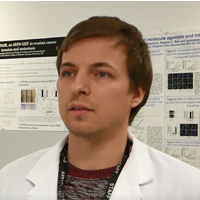-
PM-130
Fundamental Research Skills
This module is designed to develop the skills required for students of biochemistry and genetics degree programmes. Students meet with their tutors and will be given a series of assignments designed to develop skills in key areas such as essay writing, presentations and general numeracy.
-
PM-132
Eukaryotic Cell Biology
This module will provide students with a broad introduction to fundamental concepts in Eukaryotic cell biology, such as investigating the origins of the cell, the structure or eukaryotic cells, the different types of specialised cells, and cells which help prevent disease. There will be a general focus on human cells throughout the module with some references to other organisms when needed. Students will gain practical experience in identification and differentiation of cells from different human and animal species.
-
PM-132C
Bioleg Celloedd Ewcaryotig
Bydd y modiwl hwn yn darparu cyflwyniad bras i gysyniadau sylfaenol ym maes bioleg celloedd Ewcaryotig, gan ymchwilio i darddiad y gell, strwythur y gell a chelloedd arbenigol a chelloedd mewn clefyd. Bydd ffocws cyffredinol ar gelloedd dynol drwy gydol y modiwl, gan gyfeirio at organebau eraill yn ôl yr angen. Bydd myfyrwyr yn cael profiad ymarferol o nodi celloedd, gwahaniaethu rhwng gwahanol gelloedd dynol a rhywogaethau o anifeiliaid.
-
PM-249
Human Immunology
The course is designed as an introduction to immunology and the human immune system. The course covers the fundamentals of immunology including functional perturbations associated with disease and experimental approaches to the study of immunology.
-
PM-277
Techniques in Molecular Biology
The module will provide a sound theoretical basis to a comprehensive range of biomolecular techniques currently employed in molecular genetics and biochemistry. Particular emphasis is placed on DNA recombinant technology, next generation sequencing, transcriptomics, proteomics and mass spectrometry.
-
PM-277C
Technegau Bioleg Foleciwlaidd
Bydd y modiwl yn darparu sylfaen ddamcaniaethol gadarn ar gyfer ystod gynhwysfawr o dechnegau biofoleciwlaidd a ddefnyddir ar hyn o bryd mewn geneteg foleciwlaidd a biocemeg. Rhoddir pwyslais arbennig ar dechnoleg ail-gyfuno DNA, dilyniannu¿r genhedlaeth nesaf, trawsgrifiadomeg, proteinomeg a sbectrometreg màs.
-
PM-280
Skills for Researchers
The modern scientist graduate is expected to have gained extensive laboratory-based experience and this is certainly essential for any student intent on pursuing a research-based career. Skills for Researchers provides students with the opportunity to acquire the core skills to be able to conduct, analyse, interpret and present scientific experiments. A proportion of the module will be spent in the laboratory gaining hands-on experience. Skills acquired in this module will form the basis for future experimental work, including the final year project. Students will have the opportunity to provide feedback to peers and engage with a variety of online learning materials.
-
PM-280C
Sgiliau i Ymchwilwyr
Disgwylir i'r myfyriwr gwyddonol modern graddedig ennill profiad helaeth mewn labordy ac mae hyn yn sicr yn hanfodol i unrhyw fyfyriwr sy'n bwriadu dilyn gyrfa yn seiliedig ar ymchwil. Mae Sgiliau i Ymchwilwyr yn rhoi cyfle i fyfyrwyr gaffael y sgiliau craidd i allu cynnal, dadansoddi, dehongli a chyflwyno arbrofion gwyddonol. Bydd cyfran fawr o'r modiwl yn cael ei wario yn y labordy yn ennill profiad ymarferol. Bydd sgiliau a gaffaelir yn y modiwl hwn yn sail ar gyfer gwaith arbrofol yn y dyfodol, gan gynnwys prosiect y flwyddyn olaf. Bydd myfyrwyr yn cael cyfle i roi adborth i gyfoedion ac ymgysylltu ag amrywiaeth o ddeunyddiau dysgu ar-lein.
-
PM-317
Genetics of Cancer
This module will provide students with an advanced understanding about the genetic mechanisms involved in carcinogenesis, and how these underlying processes and molecules affect the human body.
-
PM-344
Capstone Project
The aim of this module is to provide a capstone experience to students¿ learning, through participating in their own enquiry-based research project, with guidance from an academic supervisor. The project may be laboratory or non-laboratory based, but it will always involve a research question that is drawn from the literature, and focused on a topic relevant to the life sciences. It will ask a research question and involve the critical analysis of research findings. Students will refine their oral and written communication skills to a graduate level through an oral presentation and dissertation on their research findings and conclusions.
-
PM-347
Human Immunopathology
The module aims to provide students with a greater understanding of the human immune system and the causes of a range of diseases associated with immune dysfunction including autoimmune diseases, metabolic disorders and neurological conditions.
-
PM-378
Biomedical Laboratory Techniques
The module will provide practical and in depth theory of applications and equipment available to MSci students in the biomedical research laboratories based at the Medical School. The module will provide guidelines and rationale for experimental design, and data and statistical analysis.
-
PM-378C
Technegau Labordy Biofeddygol
Bydd y modiwl yn darparu damcaniaeth ymarferol a manwl o¿r cymwysiadau ac offer sydd ar gael i fyfyrwyr MSci yn y labordai ymchwil biofeddygol sydd wedi'u lleoli yn yr Ysgol Feddygaeth. Bydd y modiwl yn darparu canllawiau a rhesymeg ar gyfer cynlluniau arbrofol, a dadansoddiad data ac ystadegau.
-
PM-401
Science Communication
This module will encompass a range of communication modes, from presentation of science to the general public to critically analysing a scientific paper.
The module will be run as a series of online seminars to prepare, firstly, for
a short 3 minute thesis-like presentations to both a professional and non-professional audience.
This will be complemented by preparation of short, New Scientist-style articles by each student on the topic of their presentation. Students will be assigned a topic that is appropriate to their degree title.
In the latter half of the module, the focus will be on skills-training for writing a scientific paper, preparing the ground for their project dissertations.
-
PM-405
Advanced Research Project Dissertation
The advanced research project is a key component of the final year of study, providing students with experience of conducting cutting-edge research in the Institute of Life Science and Centre for Nanohealth over an extended period. The projects undertaken will fall into one of the current medically-related research themes. Students will employ a range of advanced analytical procedures to investigate a specific topic. In addition, they will gain experience in preparing a research proposal and presenting their data in various formats. Research topics will be assigned that are appropriate to a specific degree title.
-
PMNM20J
Science Communication
This module will encompass a range of communication modes, from presentation of science to the general public to critically analysing a scientific paper.
The module will be run as a series of online seminars to prepare, firstly, for a short 3 minute thesis-like presentations to both a professional and non-professional audience.
This will be complemented by preparation of short, New Scientist-style articles by each student on the topic of their presentation. Students will be assigned a topic that is appropriate to their degree title.
In the latter half of the module, the focus will be on skills-training for writing a scientific paper, preparing the ground for their project dissertations.


